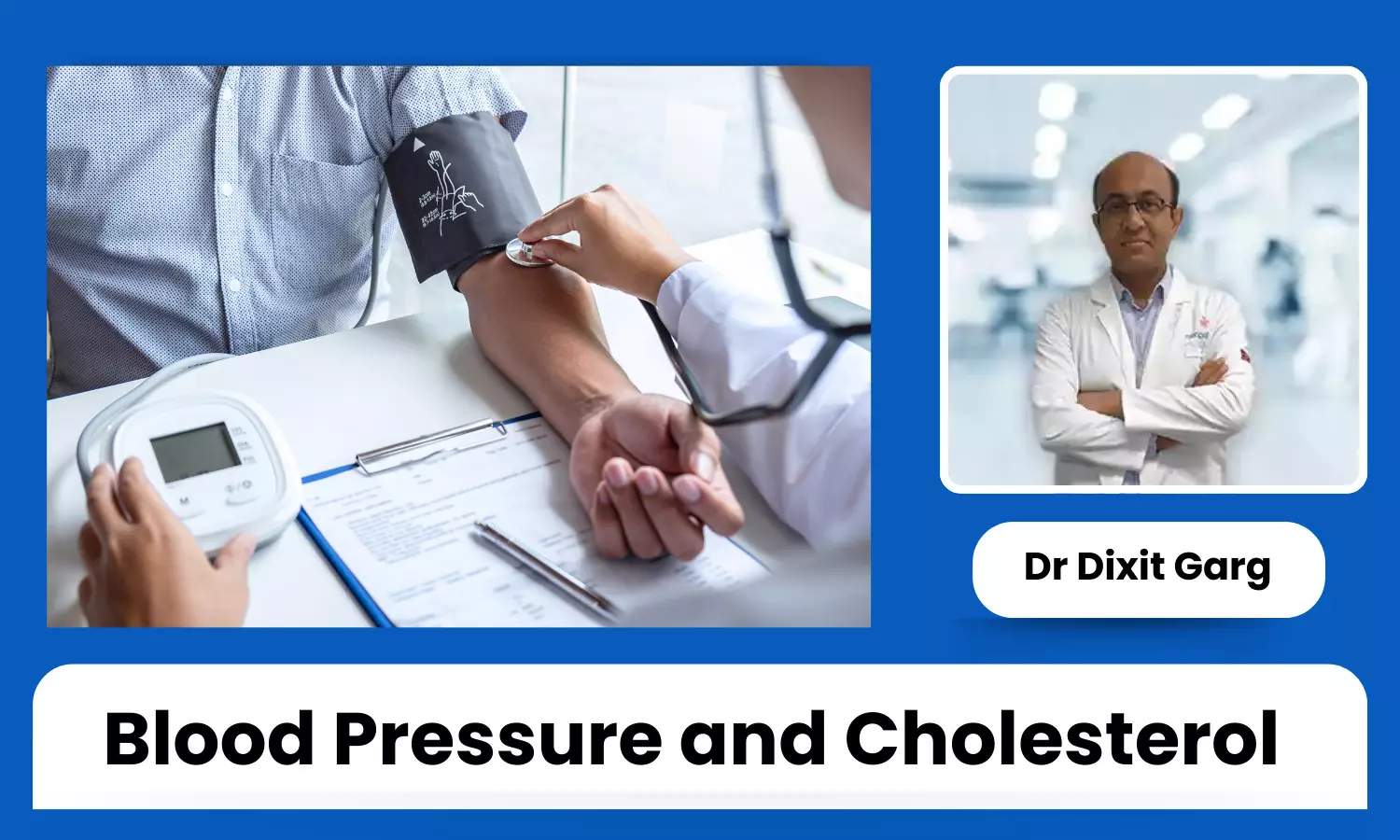Understand Your Numbers: Blood Pressure and Cholesterol Explained - Dr Dixit Garg

The terms "blood pressure" and "cholesterol" can seem a little frightening and overwhelming. They really mean so much more than two words of medical jargon. Your blood pressure and cholesterol numbers are two critically important indicators of your cardiovascular health. They give you the key insights into determining your health risks when it comes to heart disease and stroke.
Blood Pressure
Blood pressure measures the force of blood exerted on the walls of your arteries. It is measured in millimetres of mercury (mm Hg) and expressed as two numbers, systolic and diastolic. Systolic pressure is the pressure exerted on the artery walls when the heart contracts; diastolic pressure is the same as above, but when the heart is resting between each heartbeat. A normal blood pressure reading is 120/80 mm Hg. Blood pressure readings are traditionally distinguished as:
- Normal: Less than 120/80 mm Hg
- Elevated: Systolic between, 120129 and diastolic less than 80
- Hypertension Stage 1: Systolic between, 130139 or diastolic between 8089
- Hypertension Stage 2: Systolic at least 140 or diastolic at least 90 mm Hg
- Hypertensive Crisis: Systolic over 180 and/or diastolic over 120 mm Hg
Cholesterol
Cholesterol is the lipid substance in the bloodstream that is used to construct cells within the body; however, it might be bad if high. Cholesterol is categorised under LDL: low density lipoprotein and HDL: high density lipoprotein. The levels of cholesterol should be as follows:
- LDL: Less than 100 mg/dL
- HDL: 60 mg/dL or more
- Total cholesterol: Less than 200 mg/dL
Regular testing and monitoring for the purpose of ensuring that these levels remain within control and are, therefore, managed properly.
Relationship Between Blood Pressure and Cholesterol
There should be a big secret to understanding the link between blood pressure and cholesterol. Factoids include:
1. Plaque Formation and Narrowing of Arteries: Excessive LDL in the blood can stimulate the formulation of plaque within the walls of the arteries. Over time, this tapers the diameter of the arteries, making the flow of blood more challenging and raising the pressure the system must assert to be able to pump the blood, hence raising the blood pressure.
2. Arterial Rigidity: When there is excess cholesterol in one's body, it leads to arteries losing flexibility, so pressure from blood is usually high. These arteries usually broaden and narrow to cater for the necessary expansion, but is almost impossible due to stiffening due to cholesterol.
3. Higher Risks of Developing Cardiovascular Diseases: One of the most leading risks towards the development of heart diseases is high blood pressure and high cholesterol. High blood pressure together with high cholesterol sharply heightens the risk of heart attacks and strokes. Therefore, the two conditions need to be managed.
4. Inflammation: Arterial Damage: High cholesterol levels can promote inflammation inside the arteries, which damages the walls and raises blood pressure even more. This inflammation raises the likelihood of heart disease.
Blood Pressure and Cholesterol Management
Knowledge of the blood pressure and cholesterol levels is crucial regarding whether one wants a healthy heart. These numbers can be managed by keeping them checked regularly, eating a well-balanced diet, engaging in physical activity, and if necessary, medication. Strategies include:
1. Regular Monitoring: Frequent health visits will allow blood pressure and cholesterol levels to be monitored for any variations.
2. Healthy Diet: A diet rich in fruits, vegetables, and low in trans fats contributes a lot to the achievement of optimal blood pressure and cholesterol. Reducing salt consumption has also been helpful.
3. Physical Activity: Regular exercise will help to maintain the desired BP and cholesterol levels. Do at least 150 minutes of moderate exercise per week.
4. Medication: If the above lifestyle changes are not enough, medications will be needed to control BP and cholesterol levels. Always follow the healthcare provider's recommendations regarding medications.
It's important to understand that while lifestyle changes and medication are the first line of treatment for high blood pressure and cholesterol, surgical procedures are typically reserved for specific cases and are not a primary treatment for these conditions.
Here are a few instances where surgical procedures should be considered:
1. Carotid Endarterectomy: This procedure removes plaque build-up in the carotid arteries (arteries in the neck that supply blood to the brain) to reduce stroke risk in patients with significant carotid artery disease.
2. Angioplasty and Stenting: These procedures open blocked or narrowed arteries in the heart (coronary arteries) or other areas of the body. They are typically considered for patients with advanced atherosclerosis (plaque build-up) who are at high risk for heart attack or other complications.
3. Coronary Artery Bypass Surgery (CABG): This procedure creates new pathways for blood to flow around blocked coronary arteries, improving blood supply to the heart muscle. It is typically reserved for patients with severe coronary artery disease who have not responded to other treatments.
Your cholesterol and blood pressure are more than simply numbers; they serve as important indicators of your body's overall health and cardiovascular disease risk. These can be controlled by adequate medical intervention, healthy living, and routine monitoring.
Making the choice to know and manage your cholesterol and blood pressure will be crucial to living a longer, healthier life. Regular checkups and consultations with a health care provider are necessary to develop a personalised approach toward maintaining these important health parameters.


